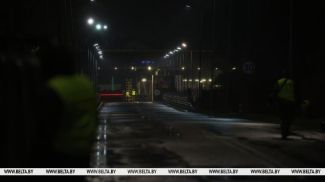MINSK, 20 May (BelTA) – The adoption of the law to prevent the rehabilitation of Nazism should be viewed as preemptive action, Andrei Ivanets, Deputy Chairman of the Standing Committee for Education, Science, Culture and Social Development of the Council of the Republic, Chief Academic Secretary of the National Academy of Sciences of Belarus, told the ONT TV channel, BelTA has learned.
“Our country preserves and honors historical memory, it shows other countries in the post-Soviet space that the feat of Soviet people has not been forgotten, the price for the Victory has not been forgotten. The name of the law “On the prevention of the rehabilitation of Nazism” means that we are acting preemptively,” Andrei Ivanets said.
The senator believes that the law will nip the alarming new trends in the bud. “The adoption of this law is a clear response to all our external and domestic opponents. It means that the society and the state interpret these concepts unambiguously. This law offers very specific definitions, so that there is no room for discrepancies or misunderstanding. I am more than sure that our society fully supports this law. We must clearly and resolutely say “No!” to Nazism, its paraphernalia and symbols and their use in our country,” the senator said.
In May Belarus President Aleksandr Lukashenko signed laws on preventing the rehabilitation of Nazism and amending the laws on counteracting extremism. Both laws had been passed by the Belarusian parliament.
Close attention has always been paid to preventing the rehabilitation of Nazism in Belarus. Tougher responsibility for spreading Nazism and its manifestations was introduced by the bill on amending the laws on stepping up fight against Nazism propaganda. The bill expanded the law on counteracting extremism, the Administrative Offences Code, and the Criminal Code of the Republic of Belarus, which came into force on 1 February 2020.
Yet it was decided that efforts to prevent Nazism rehabilitation need a separate dedicated law. The need is explained by the special significance of the problem for Belarus. Belarus suffered colossal damage due to actions of Nazi Germany and its allies during World War II, which followed the ideology of national socialism. Racial, national, and religious intolerance was central to the ideology of national socialism.
Despite that far-right ideas have gained traction in Belarus at present. Events of the past are misrepresented. Pseudohistorical articles are published online to justify Nazi criminals and their accomplices. They represent a potential threat to the national security of the Republic of Belarus.
The law on preventing the rehabilitation of Nazism is designed to comprehensively regulate the counteraction of these negative manifestations. The law reaffirms and builds up on the provisions previously stipulated by the law on counteracting extremism.













